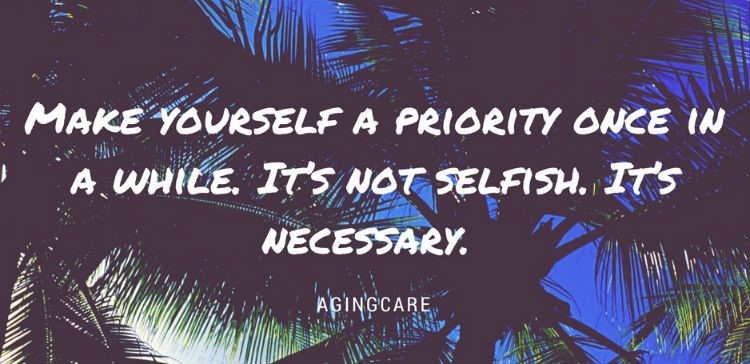“If you don’t take care of you, no one else will.”
What does this mean? For most people, it simply means that we should eat right, exercise, make healthy choices and so on.
However, this takes on a whole new meaning for those who are caring for a dementia patient. I call them “care warriors.” They are in constant “gotta-get-it-done” mode. There are no breaks to hit the local gym. There are no scheduled timeouts for meditation or taking a day off. These care warriors are in a constant battle with the disease. It is a 24-hours-a-day, 7-days-a-week battle to try to give the best care they possibly can to their loved one. But, if these caregivers don’t take care of themselves, no one else will.
This is what you could call a catch-22. You can leave your loved one for a few hours to see to your mental and physical wellbeing, but who do you leave them with? It has to be someone who understands the disease and your loved one’s quirks—their fears, likes and dislikes. In most cases, having a friend or family member drop by for a few hours isn’t going to work. Even so, with dementia, best-laid plans can fall apart in minutes. The patient may not recognize who is going to be caring for them for this short period of time. They may not be responsive to them, and they could even be afraid of them.
But how is one to know? When you have a patient who is nonverbal, how can you be sure that they are alright to be left with someone else? This is a constant uphill battle for the caregivers and families of dementia patients.
When we say, “Take care of yourself, because no one else will,” it is much easier said than done. Caring for a dementia patient is unlike caring for a patient with any other disease (especially in the later stages of dementia). The slightest thing can set them off. The stress of this could last for hours or days.
So what is the answer to this dilemma? Yes, you have to take care of yourself. Perhaps you could try to remove yourself from the emotions that come with leaving your loved one in someone else’s care. See how that works for you. If you thought you were stressed before, try taking a day for yourself and not worrying about your loved one. It won’t work.
This is the very reason the death rate amongst caregivers for those with dementia is so high. This is a disease that affects everyone around the patient. I wish I had the answer. My wife will deal with this situation one day. Every family member and caregiver will. The answer in my mind is, you still need to take care of yourself, period. If a primary caregiver falls ill or dies due to the strain of providing around-the-clock care, the patient is left alone with little or no ability to choose what happens next.
Your loved one’s reaction to a new caregiver is something you will just have to deal with. They may be scared, stressed or unruly to whomever is there with them, but the alternative of you never taking a break is one that will affect both you and your loved one in the long run. Neglecting yourself can hurt your loved one if it goes on long enough. A dementia patient whose primary caregiver has died will most likely be placed in a facility. Then, who will be their advocate? Who will ensure that they are receiving high quality care?
You can die from caregiving. It happens all too often, simply because these care warriors are just that: warriors. Most will run themselves into the ground trying to meet their loved ones’ needs. For that reason, they need to take care of themselves, no matter the cost, while they still can.
